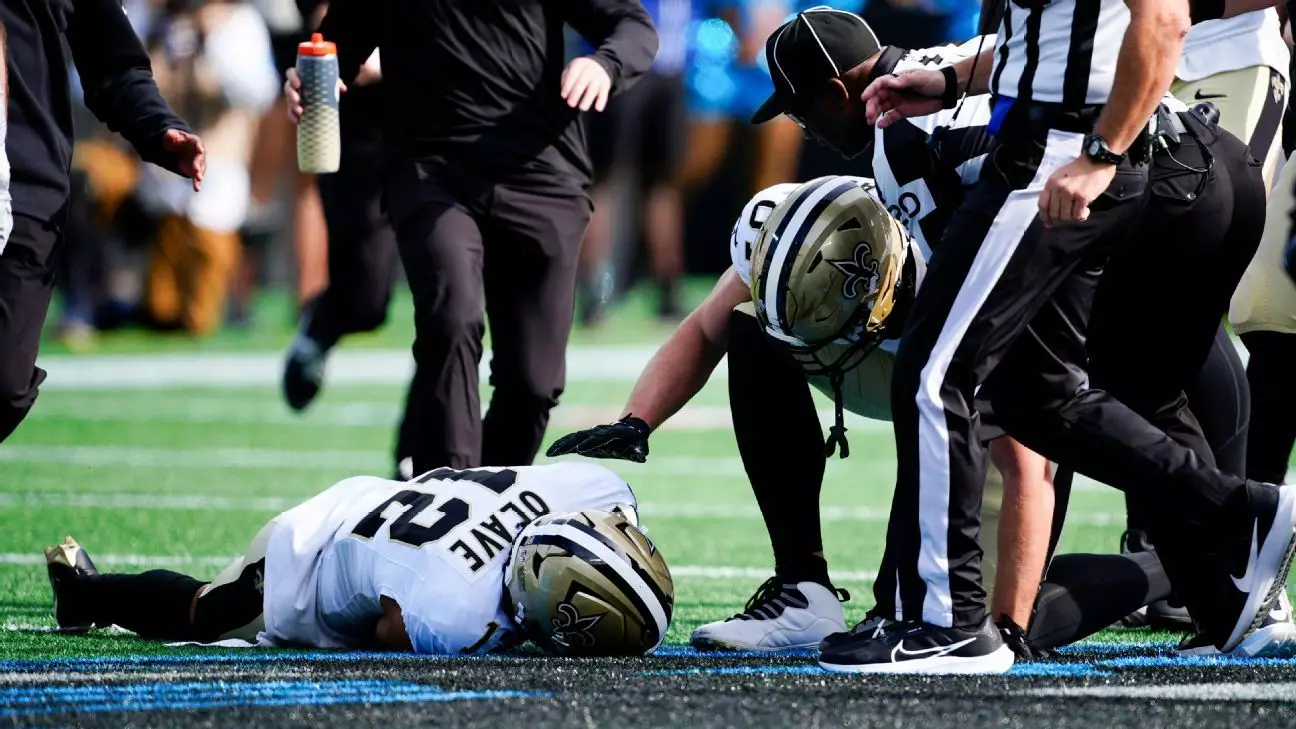In a season where player safety is an ongoing concern, New Orleans Saints wide receiver Chris Olave has found himself at the center of alarming conversations regarding head injuries. Following a significant head injury during a recent game against the Carolina Panthers, Olave was hospitalized before flying home with his team. This incident marked his second concussion this season and the fourth of his career, which brings to light both the physical risks players face in the NFL and the emotional toll such injuries can take on teammates and fans alike.
After sustaining a hard hit from Panthers safety Xavier Woods, Olave was rendered immobile on the field and needed to be transported on a cart to the hospital, a scene that elicited concern from players on both sides. This visceral reaction illustrates how deeply connected professional athletes are, often transcending team rivalries. The safety protocols governing such incidents, while crucial, do not diminish the anxiety experienced both on and off the field.
In the face of such distressing circumstances, Olave took to social media to express gratitude for the support he received, stating, “Thank God. Appreciate all the love & prayers, ima be aight.” This statement reflects not only his resilience but also illustrates a player’s need for continuous encouragement amidst professional trials. The emotional support from teammates, fans, and even rivals speaks volumes about the camaraderie that often accompanies a sport known for its violent play.
While the incident involving Olave sparked discussions about player safety, it has also raised questions about team relationships—namely between Olave’s former teammate Michael Thomas and current quarterback Derek Carr. Thomas has publicly criticized Carr’s performance and insinuated that Carr is partially to blame for Olave’s injury. This conflict adds an additional layer of complexity to the already tenuous situation.
Carr’s response highlights the challenges of navigating personal relationships in the pressure-cooker environment of the NFL. He expressed confusion over Thomas’ animosity, indicating a broader issue of communication breakdown within teams. Carr’s perspective reveals an often-ignored aspect of professional sports: the emotional struggles players face when relationships sour and how it can impact a team’s morale. His visible frustration and concern for Olave create a narrative about solidarity and emotional weight in a high-stakes sport.
The cultural dynamics at play in professional football give context to both Olave’s and Carr’s situations. The NFL operates under a relentless pressure to perform at the highest level, often at the cost of individual player health and well-being. Players frequently push through injuries, including concussions, leading to the long-term ramifications of repeated brain trauma.
Olave’s history with concussions—this recent one being his fourth—raises critical questions about the management of player health in such a physically demanding sport. Though he was equipped with a new helmet specifically designed for enhanced safety, the dangers on the field remain pervasive. This incident isn’t just a black-and-white issue; it serves as a reminder that ongoing discussions about player safety must transcend superficial measures and address the systemic issues within the league.
As the league continues grappling with how to handle player injuries, what remains clear is that immediate health and safety measures are only part of the solution. It requires a broader commitment to fostering a culture that prioritizes long-term player welfare. Educating athletes on the signs of head trauma and providing better strategies for recovery following such incidents are paramount for building a supportive environment that stretches beyond the playing field.
Moreover, the dynamics exposed in Olave’s situation—tensions between teammates, the repercussions of injuries, and the emotional weight carried by players—point to underlying issues that need to be addressed. The incidents surrounding Olave’s injury underscore the necessity for not only improved safety protocols but a concerted effort from teams and coaches to nurture a supportive atmosphere enabling athletes to voice their concerns and opinions transparently.
Chris Olave’s recent concussion serves as a sobering reminder of the risks faced by professional athletes and the interconnectedness of their experiences. It beckons a reevaluation of team dynamics, player health strategies, and emotional support mechanisms critical to fostering a safer, healthier, and more cohesive environment for all players in the NFL.


Leave a Reply